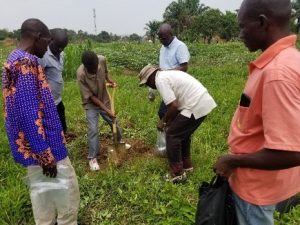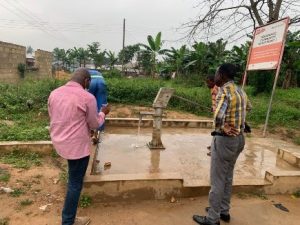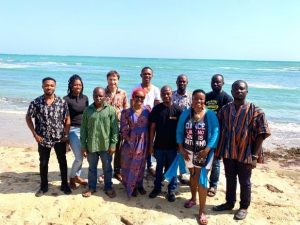2022 was an amazing year, during which ACA’s internal investments increasingly paid off in terms of concrete results for communities and civil society partners across West Africa.
At ACA, we help West African communities that are threatened by the destructive impacts of extractives-led development take control of their own development and use law and science to fight off threats to their chosen future. We are a laboratory for community-driven development and legal action, an incubator that helps our partners acquire the capacities to champion the interests of threatened communities, and a launch pad for new institutions that train and encourage lawyers, scientists, and development professionals to act in the interest of communities.
In 2022, we made progress on all these fronts, and threatened communities are benefiting as a result.
First, as always, we experimented and perfected innovative legal and community-driven development (CDD) tools to help communities seek remedies for abuses by powerful economic actors and build resilience to their impacts and attacks:

- We piloted a CDD intervention for women who lost their livelihoods to a sprawling diamond mine in Koidu, Sierra Leone. The project has brought the women such hope that they are now the unshakable core of our legal strategy as well.
- We helped Ghanaian citizens induce the suspension of a polluting mining company’s operating permit and the filling of abandoned mining pits through Citizens Committee Network (CiCoNet), a community-government interface group that we sponsored and trained to advocate on their communities’ behalf.

- Our new case in Liberia, on behalf of villages whose land was stolen by the giant Salala Rubber Plantation, survived a Motion to Dismiss and seems headed to trial. If we win, the case will invalidate a massive, country-wide land grab that the Liberian state perpetrated against indigenous communities in 1956 and establish that compensation is due when indigenous land is given to foreign companies.
- We crafted a strategy to use the French courts to enforce the judgment of the ECOWAS Court of Justice in the Zogota massacre case by seizing Guinean state assets. A case will be filed in the coming months to strike a blow against international crimes and deter corrupt leaders from stashing ill-gotten wealth.
- ACA’s Science Adviser coordinated three citizen-science studies using ACA’s methodology for community-driven scientific analysis. The results will be used in litigation and to design additional community-led interventions to improve their living environment.



Second, we promoted partners’ capacity to use our most effective techniques, especially through the Public Interest Lawyering Initiative for West Africa (PILIWA):
- With our coaching, our partner in Niger adapted a tool called compulsoire from a PILIWA member in Côte d’Ivoire. This led to the first successful legal action in Niger to compel pre-litigation disclosure of information, unblocking a major barrier to civil justice.
- We launched a webinar series on innovations for justice in West African legal systems.
- ACA began holding M&E and strategic planning seminars for key ACA partners.
And third, we are taking huge steps forward in building a foundation of public interest activists and organizers across West Africa through training institutions and programs:
- ACA is scaling up from 7 to 107 CDD communities in Ghana, in partnership with local government authorities! By working with local District Assemblies, we will build a wide-reaching and lasting base of CDD-trained government authorities and civil society partners.
- ACA’s Science Adviser is working with universities across West Africa and will begin training young scientists in our community-driven methodology in 2023.
Given all of these advances, 2023 is going to be a huge year. We’ll begin the massive scale-up of our CDD work in Ghana and launch a legal clinic in Nigeria. We’ll go to trial on cases in Ghana and Liberia, file transnational litigation arising out of Guinea and Nigeria in France and Italy, take a case on appeal in Sierra Leone, and launch litigation in Côte d’Ivoire and Niger. Our citizen-science studies in Senegal and Sierra Leone will be used for advocacy and, potentially, litigation.


Recent Comments